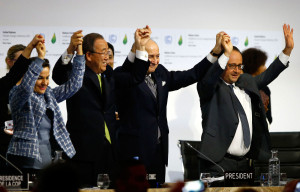December brings crucial but overdue agreements

Leaders after the final conference at the COP21, the United Nations conference on climate change, in Le Bourget, north of Paris
The year is ending with a burst of activity among nations seemingly united by the holistic and wholesome realisation that this planet is a shared resource and people’s lives are heavily interdependent. Led by the United Nations, three key international deals were agreed in December: the Paris pact, the first in history to commit all countries to cut carbon emissions; a Security Council resolution outlining a peace process for Syria, the first unanimous one in nearly five years of war and a national unity government for Libya.
Some might say they make for an impossible trinity and the only thing commendable about the international focus on all three issues is that it is there at all.
That focus underlines the joined-up nature of news stories in the world today and the nature of causality. As became startlingly clear in 2015, the cause and effect chain is as long as the next sentence. Untenable politics can cause crop failure and conflict, which leaves space for extremist groups to flourish, forcing people to flee their homes for safe locales, where the host population will inevitably find itself inconvenienced.
The specifics of the chain are as follows. Unsustainable environmental practices pursued by Bashar Al Assad’s late father, Hafez, made Syria’s northeastern breadbasket more vulnerable to drought and crop failure. In 2008, the driest winter on record, the government was forced to import wheat and tried to offset the extra expense by cutting fuel and food subsidies.
This triggered unrest, which gained momentum as other causes were added on and spiralled with Mr Al Assad’s use of brutal force. Five years on, millions of refugees from the killing zones created by government troops and rebel fighters are heading for Europe, triggering a crisis that extends to almost every aspect of the European Union – security, cultural values, community spirit. Until a few months ago, the primary migration route was lawless and leaderless Libya, from where smugglers ran deadly voyages to Italy and Malta.
With everything interlinked, the three December agreements are both crucial and overdue. Unfortunately, they are not a done deal. The Paris pact does not solve issues to do with climate change and global warming and is, in any case, only partly legally binding.
The UN’s Syria resolution has brave dreams spelt out in big words, including the establishment of “credible, inclusive and nonsectarian governance” within six months and “free and fair elections” under UN supervision within 18 months. However, there is no clarity on how to bring about a ceasefire next month and monitor and maintain it. No one knows how, or even if, the controversial transition from Mr Al Assad can be managed. US secretary of state John Kerry has admitted that no one can say “the road ahead is a gilded path”; his Russian counterpart Sergei Lavrov has been gloomy about the “complicated” task and said he was “not too optimistic”.
But it is the agreement on a so-called unity government for Libya that may be the most undercooked bit of the three items on the table. To the two rival governments – the internationally recognised one in Tobruk in the east and the other in the capital Tripoli – has been added a third.
This is headed by Faez Al Serraj, a man recently described in unenthusiastic terms by former Italian foreign minister Emma Bonino, who dismissed him as “a relatively unknown politician prior to his nomination by the UN”.
There are concerns that security conditions may prevent him taking office in, and charge of, Tripoli. There is the fear the new UN-sponsored body may actually exacerbate tensions because Tobruk and Tripoli, which otherwise agree on nothing, are united in their opposition to the deal.
But the Libya agreement is not about peace so much as war, more particularly the ability to make war. US president Barack Obama is understood to have plans for a coordinated “squeeze them” strategy to fight ISIL by hitting the group in Syria, Iraq and Libya at the same time.
This has been on hold because Libya’s two warring governments have refused to invite military intervention, something that Mr Al Serraj is expected to do with speed and expediency. The result would be air strikes by the US, UK and other countries in an attempt to degrade if not destroy ISIL in Libya.
The focus of air strikes would be Ajdabiya in the north-east, which ISIL wants to take to gain access to oilfields in the Sirte basin, and an ISIL training base at Al Ajaylat near the Tunisian border.
It’s generally acknowledged that an air campaign would not be enough to dislodge the group from Sirte, which sits on the coast roughly equidistant from Ajdabiya and Al Ajaylat.
In Sirte, ISIL’s new propaganda video claims it is so organised there is a police force, complete with proper vans equipped with emergency lights and traffic cops. Once known for being Muammar Qaddafi’s home town, ISIL’s Sirte stronghold is dangerously close to Europe – just 600km from the Italian island of Lampedusa.
So what is the point of a new bombing campaign in Libya? Once again, making it a theatre of war for the West may not help stabilise the country.
The new “government” is unlikely to be able to take control – and the oilfields – from the numerous armed militia, tribal groups and alliances. It may become unpopular for facilitating western air strikes, especially in the event of collateral damage.
After December’s deals, the cause and effect chain may have only got longer.
Originally published at The National
On Twitter: @rashmeerl

